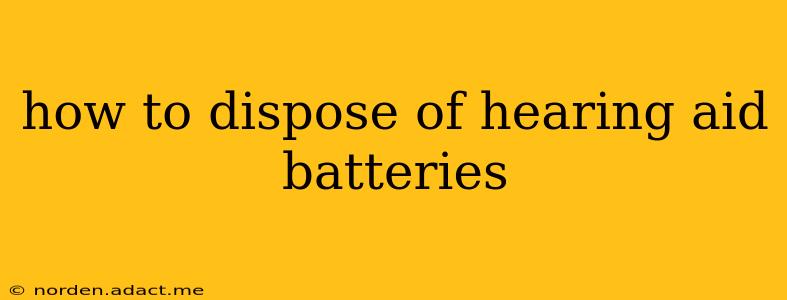Hearing aid batteries are small but mighty, powering devices crucial for many people's quality of life. However, these tiny powerhouses contain zinc and other materials that can be harmful to the environment if not disposed of properly. Improper disposal can lead to soil and water contamination, posing risks to wildlife and potentially even human health. This guide provides a comprehensive overview of safe and responsible hearing aid battery disposal.
What Makes Hearing Aid Battery Disposal Different?
Unlike typical household batteries, hearing aid batteries are often small and easily mistaken for other items. This can lead to accidental ingestion, especially by young children. Moreover, their chemical composition necessitates special handling to prevent environmental damage. Simply throwing them in the trash isn't enough.
How to Dispose of Hearing Aid Batteries Safely:
The most crucial step is never to throw hearing aid batteries in the regular trash. Their small size makes them easy to miss during waste sorting, potentially leading to them ending up in landfills where they can leach harmful chemicals.
Here's a breakdown of responsible disposal methods:
1. Local Recycling Programs: Many communities offer battery recycling programs. Check your local municipality's website or contact your waste management service to see if they have a specific program for small batteries, including hearing aid batteries. Some pharmacies and hearing aid clinics may also accept used batteries for recycling.
2. Retail Drop-off Locations: Some retailers, particularly those that sell hearing aids or batteries, participate in battery recycling programs. Check with your local stores to see if they accept used batteries for recycling.
3. Mail-Back Programs: Some battery manufacturers offer mail-back recycling programs. These programs often provide prepaid envelopes or labels for you to send your used batteries back for proper recycling. Look for information on mail-back programs on the packaging of your hearing aid batteries or on the manufacturer's website.
4. Hazardous Waste Facilities: In some areas, hazardous waste facilities accept small batteries like hearing aid batteries. This is usually a good option if local recycling programs are unavailable or inadequate.
Important Considerations:
- Tape the terminals: Before disposing of used hearing aid batteries, cover the terminals with tape to prevent short circuits and potential fires. This is an important safety precaution.
- Keep them out of reach of children: Small batteries pose a significant choking hazard to young children. Store used batteries safely until you can dispose of them properly.
- Check for specific battery types: Some types of hearing aid batteries might have different disposal requirements than others. Always check the packaging for any specific instructions.
What Happens During Recycling?
The recycling process for hearing aid batteries involves separating the different components and recovering valuable materials like zinc and other metals. These recovered materials can then be used to manufacture new products, reducing the need for mining and conserving natural resources.
Frequently Asked Questions (FAQs):
Can I put hearing aid batteries in the regular trash?
No, you should never throw hearing aid batteries in the regular trash. They contain materials that can harm the environment and should be recycled properly.
What are the environmental dangers of improper disposal?
Improper disposal of hearing aid batteries can lead to soil and water contamination from the leaching of zinc and other harmful chemicals. This poses risks to wildlife and potentially human health.
Are hearing aid battery recycling programs widely available?
The availability of hearing aid battery recycling programs varies by location. It's crucial to check with your local municipality, waste management service, retailers, or manufacturers to determine what options are available in your area.
Where can I find a drop-off location near me?
The best way to find a drop-off location is to search online using keywords like "hearing aid battery recycling near me" or to check your local municipality's website for recycling information. You can also contact your hearing aid provider or local pharmacies.
Is it safe to throw away old batteries with the positive and negative terminals taped?
While taping the terminals reduces the risk of short circuits, it does not eliminate the environmental hazards. Taping is a safety precaution, but proper recycling remains essential.
By following these guidelines, you can ensure the responsible disposal of your hearing aid batteries, contributing to environmental protection and a healthier planet. Remember, even though they're small, their impact is significant.
